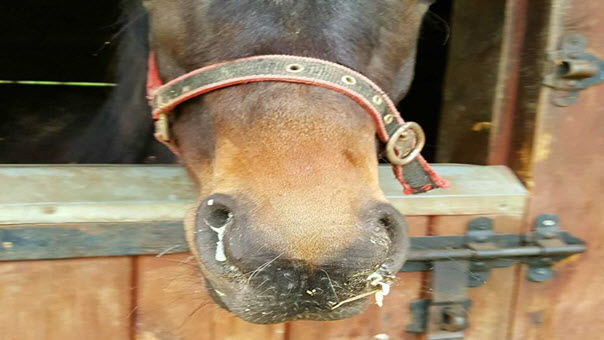I have three yearlings under my charge, every morning each one starting with a large mug of warm “Pukka” Lemon Ginger and Manuka honey herbal tea with a few smashed up cloves of garlic in their feed.
How many times have I heard over the past few months “every foal in the country has a snotty nose” and the mentality is “they'll get over it”. In most cases this is true, however our weather of late has thrown many a challenge at these youngsters who at the early age of 6 months already have to cope with stresses from weaning, domestication ( i.e varieties of hard feed, confined spaces, learning to walk in hand), sales preparation, sales environment and transport. I know a few who continue to struggle with the snotty nose even after 2 doses of antibiotics, Immune boosting supplements, good food and plentiful fresh bedding. On the rare dry day, they get out for some fresh air and exercise to increase circulation and in by night.
So many locations all over Ireland are experiencing ‘different’ weather patterns. Temperatures and rainfall have swung wildly from summer like one day to wet, cold winter the next. Horse owners can find their rugged horse has either been sweating all day or the temperature drops suddenly below freezing and their unrugged horse cold. Ideal conditions for coughs, colds and chills.
If a horse has a runny nose and eyes may be a little wet, they could be coming down with a cold. The earlier action is taken, the better the outcome. As soon as there is a suspicion the horse may be succumbing to a chill, fever or cold, that’s the best time to start giving the horse’s immune system some help to shake it off quickly before it becomes entrenched.
If symptoms are evident, take the horse’s temperature morning and evening (normal temperature is between 37 and 38 degrees). Keep a record in case a veterinarian is required at a later date. For mild symptoms, some of the following herbal remedies may be effective in preventing further complications.
Ginger rhizome (Zingziber officinale)
Fresh ginger root has been scientifically proven to be effective against the common cold. Dried ginger and ginger powder do not have the same therapeutic effect. Ginger is in the same plant family as turmeric and cardamom, all of which are known for their anti-inflammatory properties.
Finely slice a 3-5cm knob of fresh ginger root, add 1.5-2cups of boiling water, let cool and pour all the contents overfeed. To treat a cold do this morning and evening for 5-7 days. Fresh ginger tea is also good for any sort of digestive weakness, bloat or travel sickness.
Garlic. (Allium sativum)
A Very Powerful Medicinal Plant. Nature’s antibiotic! Use fresh cloves preferably from Irish organically grown garlic. This is a powerful antibacterial which helps fight the common cold. (Not to be confused with the cheap imported or dry granulated garlic, which is often treated with toxic chemicals. Garlic is very nutritionally complete containing numerous mineral substances and trace elements... calcium, copper, magnesium, phosphor, selenium, sulphur, zinc, iron. Vitamins, Provitamins such as A, B1, B2, B3, B5.. C & E
Chop or slice 2-3 cloves and either add to feed or any of your tea combinations. Garlic may be safely used over 2-3 weeks, but be aware prolonged consistent consumption by the horse may cause Heinz Cell Anemia. Garlic is traditionally planted at the Autumn between September 15th and November 30th, after the first light frost of the year and harvest sometime mid-summer when half of the leaves have gone brown – but this crazy weather has upset the growing window!
Thyme (Thymus vulgaris)
Antibacterial, antimicrobial, anti-fungal. Particularly effective in the upper respiratory tract. Thyme tea will quickly resolve sore throats, coughs and colds.
Ideally 5-10 sprigs of fresh plant or 1.5 teaspoons of dried herb. Add 2 cups of boiling water, let cool. Pour entire contents overfeed. Dose 2-3 times daily reducing on the improvement of symptoms.
(Be aware there are several subspecies of Thymus vulgaris which are low in phenol so of little therapeutic value). Thyme is easy to grow at home in a sunny spot.
Nasturtium (Nasturtium officinale)
Nasturtium Officinale, more commonly known as watercress has broad antibiotic and anti-fungal actions. Nasturtium leaves and flowers are useful for any respiratory conditions. Add to a tea. A lot of people grow this plant for decoration in their garden and is a well-known salad crop. It is seen as a very healthy, vitamin and mineral rich food and as such has gained a reputation for its medicinal uses.
NB: Teas, decoctions and infusions (also known as tisanes) extract all the water-soluble constituents into the fluid medium, so are utilised in the system more rapidly than ingesting the herb itself.
Echinacea Root (Echinacea angustifolia and Echinacea purpurea)
Use for all acute or chronic infections including the common cold, respiratory conditions, catarrh, bronchial asthma or a cough. The number one immune booster. Purchase dry root from a reputable herb supplier or health store or see your qualified herbal practitioner to access the standardised potent liquid extract.
Pharmaceutical grade Echinacea is expensive but worth it! Buy the herbal decoction, which should send your tongue briefly numb if it is the real deal!
My clients find homoeopathic Echinacea really help their competition horses, particularly whilst travelling from place to place where there’s often a horse with a cough or cold.
The above herbs are just a few. There is a myriad of herbs which are used to help horses or humans to rid their bodies of any cold and flu symptoms. Some of these are Andrographis, Elder Berry or Elder Flower, Horseradish, White Horehound and Yarrow.
Progress, the first morning in months, This yearling sticks his tongue out and says goodbye to the snotty nose after 7 Days and Nights mixing different herbal teas with crushed garlic into each feed to help rid them of the snotty mucus.







